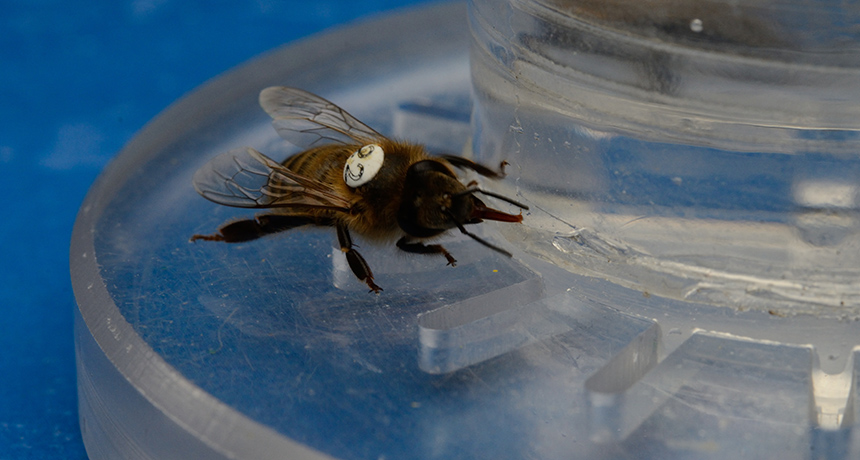News Brief: Bees prefer caffeine-spiked nectar
They return more often to flowers offering them a jolt of caffeine

Here, a worker bee samples sugar water from experimental feeders — some containing caffeine — to see how the stimulant affects their behavior.
ROGER SCHÜRCH
It’s no secret that some plants lace their nectar with caffeine. It seems to attract more pollinators, which is certainly good for the plant. And the buzz that the insect gets sticks around in a bee’s memory. Maybe that’s what brings honeybees back to caffeinated flowers over and over again, a new study suggests. Bees seem to find the treat so enticing that they even broadcast its whereabouts to their buddies.
Margaret Couvillon at the University of Sussex in Falmer, England and her colleagues describe their new findings in the November 2 issue of Current Biology.
Not all flowers serve up caffeine, but more than half of them seem to, the researchers say. One likely reason: The bitter compound deters insects from feeding on a plant’s leaves. But the low levels of caffeine in nectar certainly do not deter pollinating bees.
For its new study, Couvillon’s team set up bee-feeding stations. Each had sugar water, a substitute for a flower’s nectar. Then the scientists let marked bees go out foraging for food. Normally, bees respond to sweeter nectars by changing their waggle dance. It’s where bees wiggle their rear ends to signal where good sources of food are. (Fun fact: Karl von Frisch shared the 1973 Nobel Prize in physiology or medicine for his pioneering work on wiggle dancing by bees. He showed as early as 1923 that it constituted what he considered a type of language.) The sweeter a nectar is, the more than bees tend to forage and dance. But in the new study, the level of sugar in both types of feeding stations was identical. The only thing that differed was whether it had caffeine.
Bees that sipped caffeine-laced sugar water foraged more than bees getting plain sugar water. However, they also focused that extra foraging in search of more caffeine. Insects swigging the caffeinated water also performed four times as many waggle dances.
This suggests that caffeine was at least as enticing to the bees as the sugar was. And that’s an important finding. The reason: Some plants seem to substitute caffeine for sugar in their nectar, the researchers note. These plants may therefore dupe bees into pollinating their flowers by offering them a low-sugar drink, even though it’s not as good for making honey.
Power Words
(for more about Power Words, click here)
caffeine A stimulant, which activates the nervous system and heart. The leaves, seeds and fruits of many plants contain caffeine. In coffee plants and tea bushes, caffeine acts as a natural pesticide. It will kill or harm insects that attempt to dine on the plant. Caffeine is also toxic to some types of plants, bacteria — even frogs and dogs.
dupe To fool.
forage To search for something, especially food. It’s also a term for the food eaten by grazing animals, such as cattle and horses.
nectar A sugary fluid secreted by plants, especially within flowers. It encourages pollination by insects and other animals. It is collected by bees to make into honey.
pollinator Something that carries pollen, a plant’s male reproductive cells, to the female parts of a flower, allowing fertilization. Many pollinators are insects such as bees.







